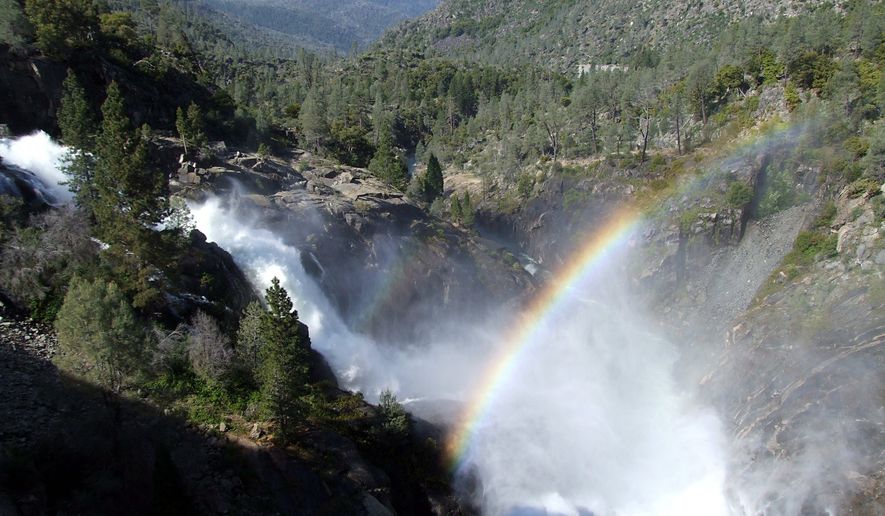The Endangered Species Act has wreaked havoc for decades on rural communities, but a newly filed lawsuit could force San Francisco urbanites like House Minority Leader Nancy Pelosi to share their pain.
A federal complaint filed this week contends that the Hetch Hetchy Project, which supplies water to San Francisco and the Bay Area, has unfairly enjoyed an exemption from the “severe cutbacks” required in rural California in order to save endangered fish species.
Craig Manson, who heads the Center for Environmental Science, Accuracy and Reliability (CESAR) in Fresno, said the lawsuit is aimed at addressing the “double standard” that forces farmers to give up water in the name of species conservation — without requiring Bay Area residents to do the same.
Mr. Manson wants the National Park Service to press the U.S. Fish and Wildlife Service to end the special exemption from the Endangered Species Act (ESA), but “the Park Service just won’t do it.”
Why not? Jeffrey Olson, National Park Service spokesman, said the agency cannot comment on ongoing litigation, but critics point out that San Joaquin Valley farmers have nowhere near the political clout of San Francisco’s political leadership, which includes Mrs. Pelosi and a good chunk of the state’s dominant liberal power structure.
“I think the law is being subjectively applied,” said Aubrey Bettencourt, executive director of the California Water Alliance. “California is a tale of two cities. If you added all the agrarian counties of California together in terms of registered voters, that’s not even enough to offset either San Francisco or Los Angeles. There are not enough votes.”
SEE ALSO: Pelosi to be guest judge on TLC baking show
The Hetch Hetchy Project at Yosemite National Park diverts water from the Tuolumne River dam to a pipeline that sends water 167 miles away to San Francisco. Without that diversion, about 15 percent more water would flow to the Sacramento Delta, which is critical habitat for threatened fish like the delta smelt, the green sturgeon and several species of salmon, according to the lawsuit.
The Fish and Wildlife Service and National Marine Fisheries Service have ordered “severe cutbacks” in the amount of water provided to the Central Valley in order to protect the fish habitat, says the lawsuit, but those agencies “have required no such cutbacks for the Hetch Hetchy Project diversions because [the] defendants have never initiated the statutorily required ESA consultations.”
San Francisco residents may be some of the nation’s most ardent defenders of the environment and endangered species, but they’ve also resisted for decades calls from environmentalists to drain the Hetch Hetchy reservoir, which provides 85 percent of the city’s water.
“San Francisco is politically powerful in California, and they have been able to fend off Hetch Hetchy lovers for years,” said Mr. Manson. “If that valley, the Hetch Hetchy Valley, were anyplace else, it would not have been flooded in the first place. It just goes to show people are wedded to their own interests even if it goes against their philosophical leanings.”
While environmentalists have long pushed to drain the Hetch Hetchy reservoir, they’re not exactly embracing the lawsuit. Kieran Suckling, executive director of the Center for Biological Diversity, accused CESAR of attempting to provide more water for “Big Ag.”
A former Department of the Interior assistant secretary under President George W. Bush, Mr. Manson serves as general counsel for the Westlands Water District, which serves agriculture customers in Fresno and Kings counties.
PHOTOS: Democrats behaving badly: Scandals taint party in a tough election year
“The goal is not to provide more water for fish, the goal is to provide more water for Westlands,” Mr. Suckling contended.
Mr. Manson stressed that Westlands is not involved in the lawsuit “and in fact may think it imprudent.”
His nonprofit is dedicated to supporting scientific research “with an emphasis on ensuring absolute rigor and complete transparency, rather than a focus on outcome.”
He’s also focused on ensuring that rural Americans aren’t the only ones forced to bear the costs of federal environmental regulations. The group’s mission also calls for “consistent application of these statutes throughout all industries and all sectors.”
Mr. Suckling accused CESAR of “trying to turn urban areas against the environment” by playing the water card in the midst of a drought. San Francisco leads the state in water conservation, according to the San Francisco Chronicle.
But Mr. Manson argued that cities shouldn’t be exempt from species-conservation mandates.
“There seems to be an attitude of, ’Well, they’re just farmers,’ and some of the more urban jurisdictions don’t care very much about the farmers,” said Mr. Manson. “There are a lot of people who don’t understand agriculture, frankly, and they believe the [rural] water users are the biggest threat to the Delta, and they certainly are not.”
The lawsuit, filed in U.S. District Court for the District of Columbia, names the National Park Service, the Interior Department and Interior Secretary Sally Jewell as plaintiffs.
Debate has raged for years over the Hetch Hetchy Valley’s O’Shaughnessy Dam, which was built in 1913 and flooded the picturesque wilderness under 300 feet of water. Environmentalists have fought for years to drain the dam and restore the valley to its original state.
“The politicians in San Francisco will tell you they have no other choice, and I’m not sure that’s the truth,” said Mr. Manson. “San Francisco politicians are protecting their turf. They’re not in a mood to share. And with the conditions we have in California today, which we will have for a long time because it’s a naturally semi-arid area, it’s time to share. Share the benefits and share the burdens.”
• Valerie Richardson can be reached at vrichardson@washingtontimes.com.




Please read our comment policy before commenting.